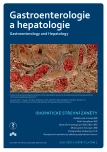-
Medical journals
- Career
The use of vedolizumab for the treatment of inflammatory bowel disease patients in the Czech Republic
Authors: Přemysl Falt
Authors‘ workplace: Centrum péče o zažívací trakt, Vítkovická nemocnice a. s., OstravaLékařská fakulta OU v Ostravě
Published in: Gastroent Hepatol 2017; 71(1): 19-23
Category: IDB: Original Article
doi: https://doi.org/10.14735/amgh201719Overview
Background:
Vedolizumab is a novel anti-integrin antibody that selectively blocks lymphocyte migration into the gastrointestinal tract (GIT). Since March 2016, vedolizumab has been used for the treatment of inflammatory bowel disease (IBD) patients in the Czech Republic.Methods:
The Czech registry of IBD patients on biological therapy CREDIT provided data on patients who started vedolizumab treatment. Data were analyzed using descriptive statistical methods.Results:
A total of 43 patients were included, 72% with Crohn’s disease (CD), 26% with ulcerative colitis (UC), and 2% with unspecified IBD. Seventy-four per cent of CD patients suffered from inflammatory type of disease, 39% from anal, and 29% from upper GIT involvemen; 82% of UC patients had extensive colitis. In 97% of CD patients, vedolizumab treatment was indicated for luminal disease, in 26% for anal involvement, and in 7% for extraintestinal manifestation. In 73% of UC patients, treatment was started after failure of conventional therapy. In 27% of UC patients, rescue therapy was reported. Except for 16% of CD patients in remission, all patients showed signs of clinical activity. In all cases, vedolizumab was started after therapy with the biologic agent anti-TNF-α failed (61% as the third, 23% as the second, and 16% as the fourth line biologic). The reasons for failure were loss of response, primary non-response, and intolerance. In CD and UC patients, 39% and 73%, respectively, were on corticosteroids when they started vedolizumab therapy.Conclusion:
In clinical practice in the Czech Republic, vedolizumab has been used for the treatment of IBD patients with luminal disease after failure of or intolerance to anti-TNF-α treatment.Key words:
vedolizumab – Crohn’s disease – ulcerative colitis
The author declares he has no potential conflicts of interest concerning drugs, products, or services used in the study.
The Editorial Board declares that the manuscript met the ICMJE „uniform requirements“ for biomedical papers.Submitted:
6. 1. 2017Accepted:
17. 1. 2017
Sources
1. Feagan BG, Rutgeerts P, Sands BE et al. Vedolizumab as induction and maintenance therapy for ulcerative colitis. N Engl J Med 2013; 369(8): 699 – 710. doi: 10.1056/ NEJMoa1215734.
2. Sandborn WJ, Feagan BG, Rutgeerts P et al. Vedolizumab as induction and maintenance therapy for Crohn’s disease. N Engl J Med 2013; 369(8): 711 – 721. doi: 10.1056/ NEJMoa1215739.
3. Sands BE, Feagan BG, Rutgeerts P et al. Effects of vedolizumab induction therapy for patients with Crohn’s disease in whom tumor necrosis factor antagonist treatment failed. Gastroenterology 2014; 147(3): 618 – 627. doi: 10.1053/ j.gastro.2014.05.008.
4. Lukas M. Vedolizumab v léčbě ulcerózní kolitidy. Gastroent Hepatol 2015; 69(1): 29 – 32. doi: 10.14735/ amgh201529.
5. Lukas M. Vedolizumab v léčbě Crohnovy choroby. Gastroent Hepatol 2015; 69(2): 146 – 150. doi: 10.14735/ amgh2015146.
6. Colombel JF, Sands BE, Rutgeerts P et al. The safety of vedolizumab for ulcerative colitis and Crohn’s disease. Gut 2016. In press. doi: 10.1136/ gutjnl-2015-311079.
7. Bortlík M. Vedolizumab – nová anti-integrinová protilátka s vysokou gastrointestinální selektivitou. Gastroent Hepatol 2014; 68(6): 481 – 484. doi: 10.14735/ amgh2014481.
8. Schnitzler F, Fidder H, Ferrante M et al. Long-term outcome of treatment with infliximab in 614 patients with Crohn’sdisease: results from a single-centre cohort. Gut 2009; 58(4): 492 – 500. doi: 10.1136/ gut.2008.155812.
9. Bryant RV, Sandborn WJ, Travis SP. Introducing vedolizumab to clinical practice: who, when, and how? J Crohns Colitis 2015; 9(4): 356 – 366. doi: 10.1093/ ecco-jcc/ jjv033.
10. Kolar M, Duricova D, Bortlík M et al. Biosimilar infliximab in anti-TNF-naïve IBD patients – 1-year clinical follow-up. Gastroent Hepatol 2016; 70(6): 514 – 522. doi: 10.14735/ amgh2016514.
Labels
Paediatric gastroenterology Gastroenterology and hepatology Surgery
Article was published inGastroenterology and Hepatology

2017 Issue 1-
All articles in this issue
- News in 2017
- Realist
- Czech Working Group for Paediatric Gastroenterology and Nutrition guidelines for diagnostics and treatment of inflammatory bowel diseases in children – 1stedition update
- The use of vedolizumab for the treatment of inflammatory bowel disease patients in the Czech Republic
- Possibilities of minimally invasive surgery in patients with Crohn’s disease and ulcerative colitis
- Ustekinumab – a new biologic drug for the treatment of Crohn’s disease
- Skin conditions in patients with inflammatory bowel diseases
- Immunoglobulin G4-associated sclerosing cholangitis in a patient with Crohn’s disease
- Receptor mechanisms mediating activation of esophageal nerves by acid
- When is celiac disease not celiac disease?
- Are there any changes in the surgical management of stenosing rectal cancer?
- Looking back at the XVth intensive IBD course for doctors and nurses
- 14th Training and Discussion Gastroenterology Days
- The selection from international journals
- Ginkor Fort® with ginkgo biloba extract
- Intraoperative endoscopy is safe and helps to determine the resection extent in Crohn’s disease
-
Gastrointestinal infections
Herbert Tilg Lecture – Gastro Update Europe 2016, Prague
- Gastroenterology and Hepatology
- Journal archive
- Current issue
- Online only
- About the journal
Most read in this issue- Skin conditions in patients with inflammatory bowel diseases
- When is celiac disease not celiac disease?
- Ginkor Fort® with ginkgo biloba extract
- Are there any changes in the surgical management of stenosing rectal cancer?
Login#ADS_BOTTOM_SCRIPTS#Forgotten passwordEnter the email address that you registered with. We will send you instructions on how to set a new password.
- Career

